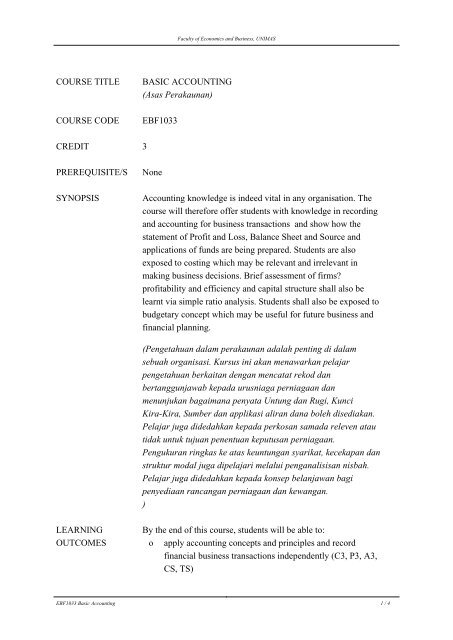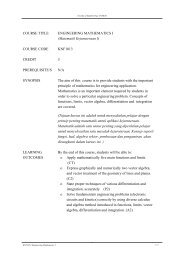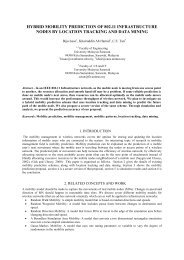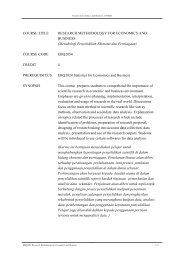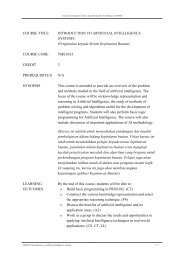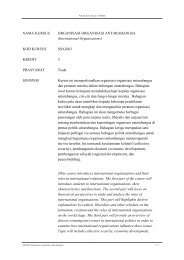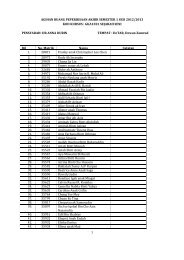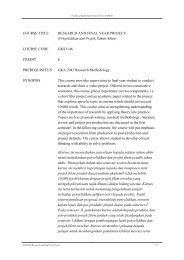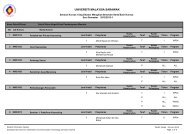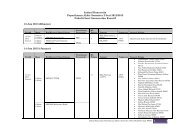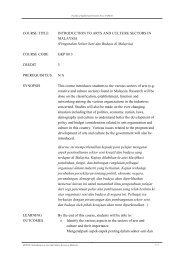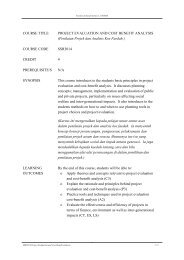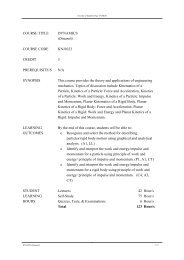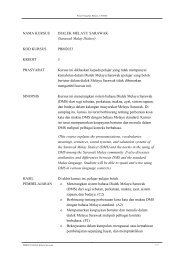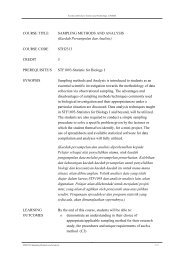COURSE TITLE BASIC ACCOUNTING (Asas Perakaunan ...
COURSE TITLE BASIC ACCOUNTING (Asas Perakaunan ...
COURSE TITLE BASIC ACCOUNTING (Asas Perakaunan ...
Create successful ePaper yourself
Turn your PDF publications into a flip-book with our unique Google optimized e-Paper software.
Faculty of Economics and Business, UNIMAS<br />
<strong>COURSE</strong> <strong>TITLE</strong><br />
<strong>COURSE</strong> CODE<br />
<strong>BASIC</strong> <strong>ACCOUNTING</strong><br />
(<strong>Asas</strong> <strong>Perakaunan</strong>)<br />
EBF1033<br />
CREDIT 3<br />
PREREQUISITE/S<br />
SYNOPSIS<br />
None<br />
Accounting knowledge is indeed vital in any organisation. The<br />
course will therefore offer students with knowledge in recording<br />
and accounting for business transactions and show how the<br />
statement of Profit and Loss, Balance Sheet and Source and<br />
applications of funds are being prepared. Students are also<br />
exposed to costing which may be relevant and irrelevant in<br />
making business decisions. Brief assessment of firms<br />
profitability and efficiency and capital structure shall also be<br />
learnt via simple ratio analysis. Students shall also be exposed to<br />
budgetary concept which may be useful for future business and<br />
financial planning.<br />
(Pengetahuan dalam perakaunan adalah penting di dalam<br />
sebuah organisasi. Kursus ini akan menawarkan pelajar<br />
pengetahuan berkaitan dengan mencatat rekod dan<br />
bertanggunjawab kepada urusniaga perniagaan dan<br />
menunjukan bagaimana penyata Untung dan Rugi, Kunci<br />
Kira-Kira, Sumber dan applikasi aliran dana boleh disediakan.<br />
Pelajar juga didedahkan kepada perkosan samada releven atau<br />
tidak untuk tujuan penentuan keputusan perniagaan.<br />
Pengukuran ringkas ke atas keuntungan syarikat, kecekapan dan<br />
struktur modal juga dipelajari melalui penganalisisan nisbah.<br />
Pelajar juga didedahkan kepada konsep belanjawan bagi<br />
penyediaan rancangan perniagaan dan kewangan.<br />
)<br />
LEARNING<br />
OUTCOMES<br />
By the end of this course, students will be able to:<br />
o apply accounting concepts and principles and record<br />
financial business transactions independently (C3, P3, A3,<br />
CS, TS)<br />
EBF1033 Basic Accounting 1 / 4
Faculty of Economics and Business, UNIMAS<br />
o<br />
o<br />
o<br />
o<br />
Prepare financial statement and abide by accounting rules,<br />
regulation and ethics. (C5, P6, A5, CS, EM)<br />
analyse profitability and performance of an organisation<br />
(C4, P3, A5, CS, CT)<br />
apply costing principles and differentiate various element<br />
of cost for decision making. (C5, P4, A4, CS, CT)<br />
prepare and apply simple budget and computerised<br />
accounting system. (C3, P3, A3, CS, LL, ES, LS)<br />
STUDENT<br />
LEARNING<br />
HOURS<br />
Lectures<br />
Self-Study<br />
Quizzes, Tests, & Examinations<br />
Total<br />
42 Hour/s<br />
70 Hour/s<br />
8 Hour/s<br />
120 Hour/s<br />
LEARNING<br />
UNITS<br />
Supervised<br />
Learning Hours<br />
1. Introduction<br />
Accounting and Finance scope<br />
Type of business organisations<br />
Usage of Financial Statement<br />
Term Definition<br />
Accounting Rules and Cycle<br />
3<br />
2. Manual Accounting Recording System<br />
Journal and ledger<br />
Asset, Liabilities and Equity<br />
Last minute Adjustment<br />
Bank Reconciliation<br />
9<br />
3. Final Accounts<br />
Trial Balance<br />
Trading and Profit and Loss<br />
Balance Sheet<br />
Cash Flows<br />
6<br />
4. Partnership, Corporate and Non-Profit Organisation<br />
Equity Presentation<br />
Society and Club<br />
Cash Accounting vs. Accrual Basis<br />
3<br />
5. Financial Ratio Analysis<br />
6<br />
EBF1033 Basic Accounting 2 / 4
Faculty of Economics and Business, UNIMAS<br />
Liquidity<br />
Profitability<br />
Market<br />
Efficiency<br />
6. Costing<br />
Element, Definition and category of costs<br />
Overhead distribution<br />
Production cost system<br />
Pricing Decision<br />
3<br />
7. Organisational Budgeting<br />
6<br />
Master budget and operational Budget<br />
Importance in planning and control<br />
8. Accounting Ethics and Cases<br />
3<br />
9. Computerised Accounting Application<br />
Receivables<br />
Payment<br />
Cash and Bank<br />
3<br />
ASSESSMENT Assigment 1<br />
20 %<br />
Assignment 2<br />
20 %<br />
Mid Term test<br />
25 %<br />
Final Test<br />
35 %<br />
Total<br />
100 %<br />
REFERENCES 1. Dyson J R, (2007), Accounting for Non-Accounting<br />
Students, FT Prentice Hall, Seventh Edition<br />
2. Jane Lazaar (2006) Accounting and Finance for<br />
Non-Accountants.<br />
(2ed) Leeds Publication. KL.<br />
3. Wood F, (2005) Business Accounting 1, FT Prentice Hall,<br />
Tenth Edition<br />
4. Wood F, (2005) Business Accounting 2, FT Prentice Hall,<br />
Tenth Edition<br />
5. Black G, (2005) Introductio to accounting , FT Prentice<br />
Hall, ist Ed.<br />
EBF1033 Basic Accounting 3 / 4
Faculty of Economics and Business, UNIMAS<br />
6. Shaari Isa (2007), Prinsip <strong>Perakaunan</strong> , Prentice Hall, 2nd<br />
ed<br />
7. Thomas A, (2006), Introduction to Financial Accounting,<br />
5th edition, McGraw Hill.<br />
Last updated: July 15, 2010, Thu, 10:21 AM<br />
EBF1033 Basic Accounting 4 / 4


